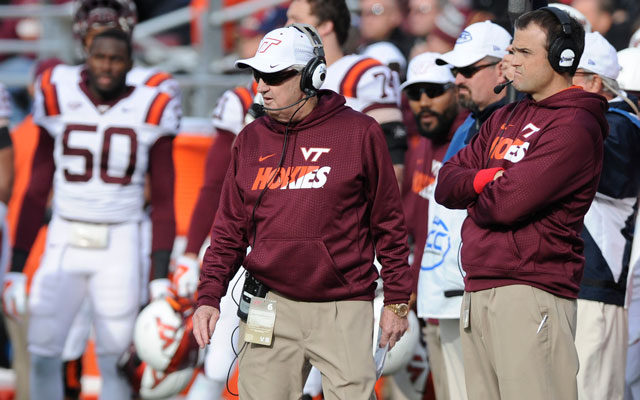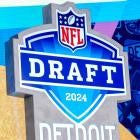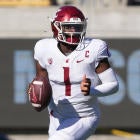Frank Beamer’s retirement is a national story because, first and foremost, he is a local treasure in Blacksburg, Va. The tears welled up for Beamer on Monday, reflecting the outpouring of gratitude from Hokies fans for an authentic coach who inspires loyalty because what you see is what you get.
Beamer is one of their own in Blacksburg. He built a rural school called Virginia Polytechnic Institute into national relevancy in football. Growing up on a farm about an hour away in Fancy Gap, Va., Beamer played cornerback at Virginia Tech, became a symbol during the aftermath of the Virginia Tech shootings in 2007, and coached his alma mater for 29 years better than anyone else ever had.
“The tough part about retiring is you’re leaving the people that you love the most, that mean the most to you,” Beamer said, fighting back tears.
The emotions pouring out of Virginia Tech over the last 24 hours can’t be properly summarized in this column from the outside. So read Roanoke Times columnist Aaron McFarling, and read SI.com senior editor Mike Harris, who covered Beamer for The Richmond Times-Dispatch from 1992 until 2006.
The core of college football, despite how big this multi-billion-dollar industry has become nationally, is still local. How many games you win based on your fans’ expectations, how you perform against your rival, how you treat your boosters, how you conduct yourself within your university’s mission -- these things still matter most in college football.
Somehow, Beamer never lost himself while he turned an agricultural school into a national football brand. Beamer Ball that revolutionized special teams, Thursday nights in Blacksburg and “Enter Sandman” became a part of the college football culture.
Beamer is a dying breed: The coach who stays at one school seemingly forever. He joins the likes of Bobby Bowden and Howard Schnellenberger as self-made coaches who created national programs out of virtually nothing. Before Beamer, Virginia Tech had one 10-win season (a 1986 year clouded by future NCAA penalties); Beamer enjoyed 13 seasons with 10 wins or more. The Hokies won 59 percent of their games from 1892 to 1986; they won 76 percent with Beamer from 1993 to 2011.
Beamer could have left many times. There was flirting with the Green Bay Packers and overtures from many college programs, including Alabama and Georgia. Beamer accepted the North Carolina job in 2000 and then changed his mind, writing in his 2012 autobiography that he flew to Chapel Hill to work out the contract details and got cold feet and came home.
“What was most important to my decision-making process was the fact that those football facilities (at North Carolina) were built on somebody else's blood and sweat,” Beamer wrote in his book. “They weren't built from my work. What we had at Virginia Tech at that time, on the other hand, and what we have built for the future, were built largely because of the success we had since 1993.”
It’s easy to forget now, but Beamer had a 24-40-2 record during his first six years in Blacksburg. The president and athletic director who hired Beamer were all gone by the sixth year. Beamer inherited NCAA sanctions from his predecessor, Bill Dooley, upon signing a four-year, $80,000-a-year contract in 1986. (In a sign of the times, Beamer now makes $2.8 million a year -- 37th among all public university football coaches -- compared to the inflation rate of $173,682 from his first Virginia Tech contract.)
The NCAA penalties notwithstanding, Beamer went 2-8-1 in his sixth year at Virginia Tech. Imagine any coach today surviving with that record given the previous five years.
“I’m glad I didn’t upset many people when I first got here,” Beamer said. “A lot of people come in and have all the answers and know exactly what needs to be done, and I don’t think I was ever that way. … I doubt if anybody could come through a time like that again. In today’s time when people want results, I don’t know that I could have made it again like that.”
Many fans wanted Beamer gone in 1992. Dave Braine, Virginia Tech’s AD at the time, recalled to SI.com earlier this year how a pesky man in church helped him reach his decision. “He’d come up to me every Sunday and tap me on the shoulder and say, ‘When are you going to get rid of Beamer?’” Braine told SI.com.
Instead of listening to those “sermons” at church each week, Braine went to Sunday morning football staff meetings and became convinced he had the right coach. That 1992 record was bad, but look deeper. Astonishingly, despite winning just two games, the Hokies were only outscored by a total of 12 points all season.
In 1993, Virginia Tech went 9-3 and began a streak of 22 consecutive bowl games. Beamer pointed to the 1995 Sugar Bowl win over Texas as a “game changer” for Virginia Tech. The Hokies, who once used to regularly give away tickets to elementary-school students, became a program that sold out a 60,000-plus-seat stadium for 93 consecutive games. Beamer’s numbers are staggering at a school like Virginia Tech: seven top-10 final rankings, seven conference championships (three in the Big East, four in the ACC), and one national championship game appearance.
Younger fans may not truly understand how influential Beamer has been to football. So consider this. Inside the bells-and-whistles of the new College Football Hall of Fame in Atlanta, there’s an exhibit devoted to coaches who innovated the game. Pop Warner gets recognized for the single wing; Bud Wilkinson for the 5-2-4 defense; Clark Shaugnessy for the T-formation; Jerry Claiborne for the wide tackle defense; Emory Ellard for the wishbone; Joe Gilliam Sr. for the nickel defense and bump-and-run; Chris Ault for the pistol offense; George Perles for the stunt 4-3 defense; and yes, Beamer for special teams.
During the 1990s, Virginia Tech blocked 66 kicks, more than any school in the country. Beamer Ball became a frightening proposition for opponents. Virginia Tech kept finding ways to score touchdowns via special teams. College and NFL coaches regularly made pilgrimages to Blacksburg to understand how Beamer did it. Opponents had to spend extra time on punt protection at practices each week.
In a way, Beamer Ball was to college football what Moneyball was to baseball with the Oakland A’s. Virginia Tech didn’t have many resources for the longest time -- the school needed political and legal pressure just to get invited into the ACC in 2003 -- but Beamer exploited how inefficient special teams was in college football. He understood the incredible momentum gained by blocking a kick during the otherwise ho-hum transition from defense to offense.
Beamer would assign every coach on his staff, including the coordinators, a duty in the kicking game. The coaches were graded on their particular role, incentivizing them to coach those kicking aspects well and not pass it off as less significant than their other jobs. Special teams paid off in a major way.
Virginia Tech averaged five blocked kicks a year from 1991 to 2010 while everyone else averaged one. Think an extra four times a year with great field position or a special teams score might win some games? In later years, Virginia Tech’s special teams prowess disappeared, and perhaps not coincidentally, so did the Hokies’ 10-win seasons.
The end has been coming for a while. Beamer is 26-22 in his past four seasons. The Hokies need to win two of their last three games against Georgia Tech, North Carolina and Virginia to keep Beamer’s bowl-eligibility streak intact.
To his credit, Virginia Tech athletic director Whit Babcock capably navigated a potentially treacherous end for a coaching legend. There will be a celebration of Beamer’s career, not an ugly departure like Florida State and Bowden or an abrupt one by Steve Spurrier as he quit on his South Carolina team during the season.
Beamer, who is an avid auto racing fan, badly wanted to coach his 30th year and be on the sidelines in 2016 when Virginia Tech plays Tennessee at Bristol Motor Speedway. The harsh realities of major college football today won’t allow that. Beamer, more than anyone else, recognized when it was time to go.
Ironically, the lower-tiered bowl games Virginia Tech fans would have killed for early in Beamer’s career are the bowl games they despise now. Virginia Tech has become a mediocre program, and that’s understandably not enough for a portion of the fans whose costs to support their team increase while the wins decrease.
“There’s been some difference of opinions out there, and anytime you’re in the public life there’s going to be differences of opinion,” Beamer said. “I understand that. But the last thing I want is Hokies being divided. I want everyone going in the same direction and I think (the timing of retiring) is right in that regard.”
In a weird way, legendary coaching retirements can feel like funerals. So it was Monday when a media member asked Beamer how he wants coaches, players and fans to remember him. “He was,” Beamer said before catching himself using the past tense, “he is who he is -- honest, caring and respectful.”
For decades, Virginia Tech has been forced to explain what in the world a Hokie is. The university public relation staff touts the story from 1896 of how a student named O.M. Stull made up the name to win a cheer contest. The university now officially defines Hokie as “a loyal Virginia Tech fan.”
It's time for a new clause added to the definition: “a loyal Virginia Tech fan and the loyalist of employees, Frank Beamer."
Follow and read more from Jon Solomon on Facebook and Twitter.






















